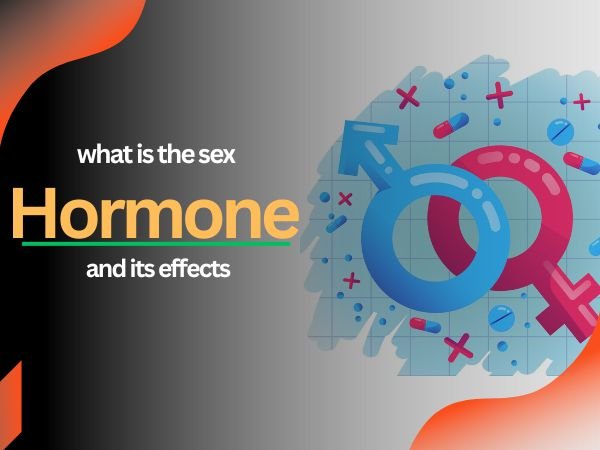Introduction:
People often ask, “What are sex hormones state their function” In this article, we explore all the information about sex hormones, sources, male-female sex hormones, Effects of hormones in our lives. Please Consider the table of contents for specific topic
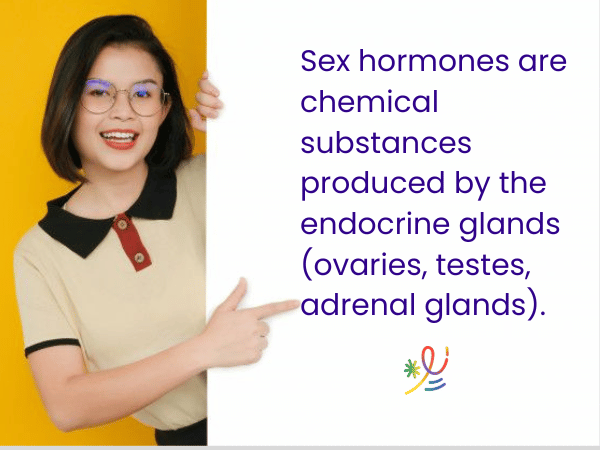
Table of Contents
sex hormones:
Sex hormones are chemical substances produced by the endocrine glands (such as ovaries, testes, and adrenal glands). Hormones play a important role in the development and regulation of sexual and reproductive characteristics.
There are two types of sex hormones. example, Estrogen and Progesterone are present in females and Testosterone hormone present in males.
Importance of sex hormones
- Fundamental role: Highlights the essential and primary function of sex hormones.
- Regulating various physiological processes: Sex hormones are involved in controlling and managing a wide range of bodily functions. This includes processes beyond reproduction, such as metabolism, immune system functionality, and the development of certain cells, tissues and organs.
- Influence on reproductive systems: Sex hormones play a critical role in the proper functioning of the reproductive organs and processes, including menstrual cycles, ovulation, and sperm production.
- Influence on non-reproductive systems: Indicates that sex hormones also have effects on systems and organs not directly related to reproduction, such as bone density, cardiovascular health, and cognitive function.
What Are Sex Hormones?
Sex hormones are chemical messengers that regulate and control sexual development and reproductive processes in organisms.
Sex hormones play a fundamental role in shaping secondary sexual characteristics, such as body hair, voice changes, and breast development.
- Estrogen:
- Estrogen is a primary female sex hormone.
- It plays a key role in the development and maintenance of the female reproductive system.
- Functions include regulation of the menstrual cycle in females, development of secondary sexual characteristics, and support during pregnancy.
- Progesterone:
- Progesterone is another important female sex hormone.
- It is mainly involved in regulating the menstrual cycle, preparing the uterus for pregnancy, and supporting early pregnancy.
- Testosterone:
- Testosterone is the primary male sex hormone.
- It plays a crucial role in the development of male reproductive tissues, such as the testes and prostate, and is responsible for the development of male secondary sexual characteristics.
Production and release of sex hormones
- Organs involved (ovaries, testes, adrenal glands):
- Ovaries: Estrogen and progesterone are primarily produced by the ovaries in females.
- Testes: Testosterone is predominantly produced by the testes in males.
- Adrenal glands: These glands, located on top of each kidney, also contribute to the production of small amounts of sex hormones in both sexes.
- Hormonal regulation:
- The production and release of sex hormones are regulated by the endocrine system.
- Hormonal regulation involves feedback loops that ensure a balance of sex hormones in the bloodstream.
- Hypothalamus, pituitary gland, and the gonads (ovaries and testes) are key components of the hormonal regulatory system.
Functions of Sex Hormones
A. Estrogen
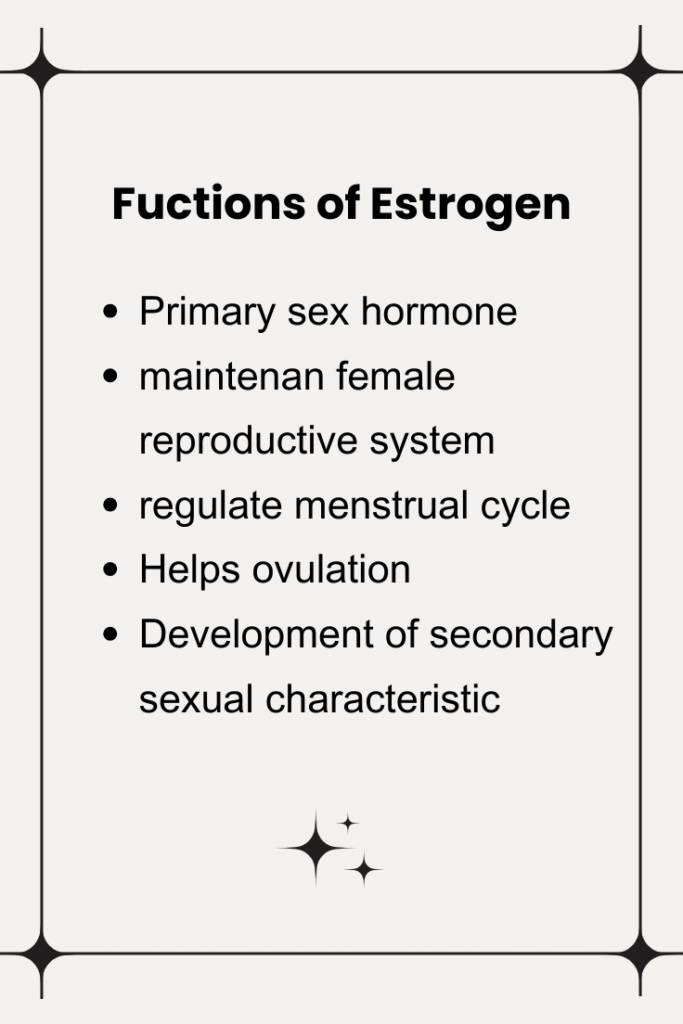
- Role in the female reproductive system:
- Estrogen is crucial for the development and maintenance of the female reproductive system.
- It stimulates the growth of the uterine lining during the menstrual cycle, preparing it for potential pregnancy.
- Estrogen is involved in the regulation of the menstrual cycle, including the maturation and release of eggs from the ovaries (ovulation).
Symptoms of early Pregnancy in hindi
- Impact on secondary sexual characteristics:
- Secondary sexual characteristics are physical traits that develop during puberty and are not directly related to reproduction.
- In females, estrogen contributes to the development of secondary sexual characteristics such as breast development, widening of hips, and changes in body fat distribution.
- Non-reproductive functions (bone health, cardiovascular health):
- Estrogen plays a vital role in maintaining bone health by supporting the absorption of calcium and other minerals.
- It has a protective effect on cardiovascular health by helping to maintain healthy blood vessel function and cholesterol levels.
- Estrogen’s influence extends beyond reproduction, contributing to overall well-being and the health of various organ systems.
B. Progesterone
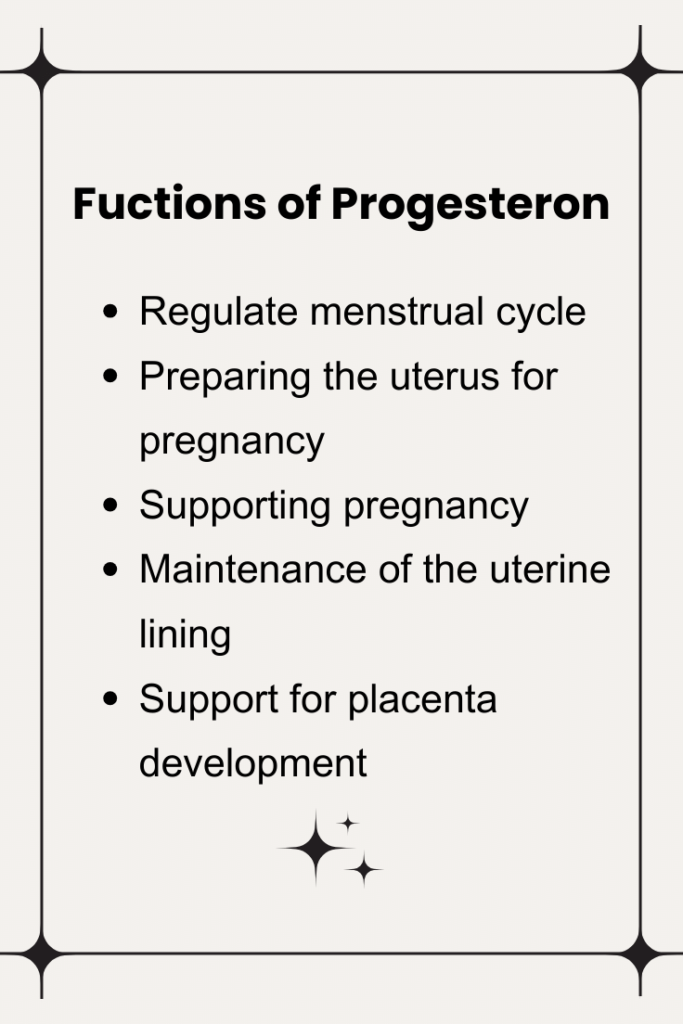
- Role in the menstrual cycle:
- Timing: Progesterone levels rise during the second half of the menstrual cycle, specifically during the luteal phase.
- Preparation of the uterus: Progesterone prepares the uterine lining for a potential pregnancy. It causes the uterine lining to thicken, creating a hospitable environment for a fertilized egg to implant.
- Inhibition of ovulation: Progesterone, in combination with estrogen, helps regulate the menstrual cycle by suppressing further ovulation during the luteal phase.
- Support of pregnancy and embryo development:
- Post-ovulation function: If fertilization occurs, progesterone continues to be produced to support the early stages of pregnancy.
- Maintenance of the uterine lining: Progesterone maintains the thickened uterine lining, ensuring a stable environment for the embryo to implant and facilitating the early stages of pregnancy.
- Prevention of contractions: Progesterone helps prevent contractions of the uterine muscles, reducing the risk of premature labor during early pregnancy.
- Support for placenta development: As pregnancy progresses, progesterone supports the development and function of the placenta, which is crucial for the exchange of nutrients and waste between the mother and the developing fetus.
C. Testosterone
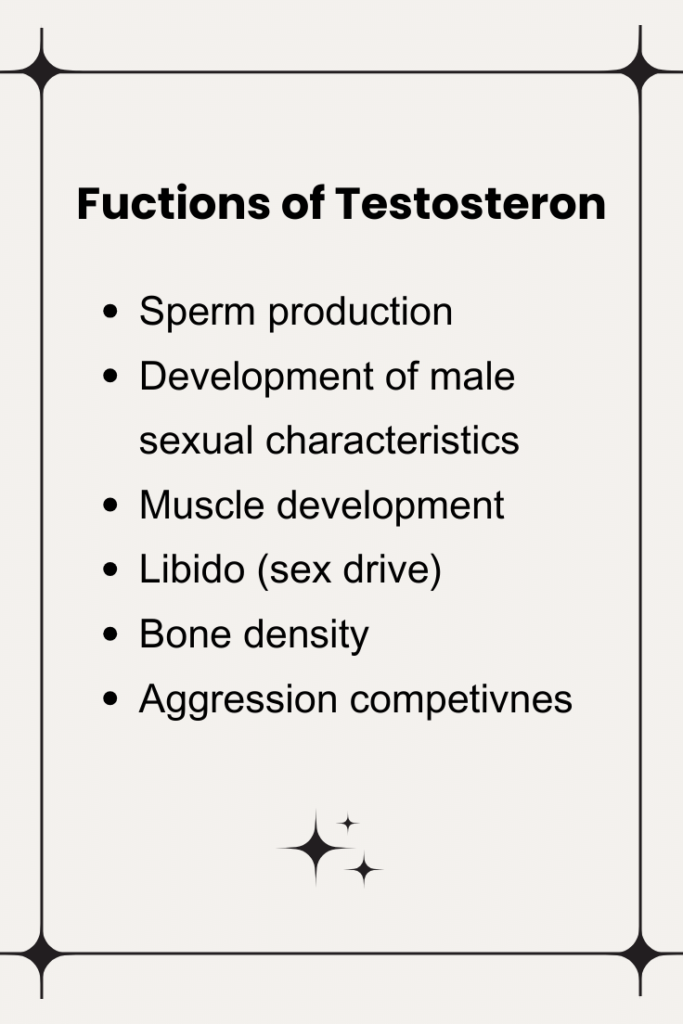
- Influence on Male reproductive system:
- Sperm production: Testosterone is crucial for the development and maintenance of the male reproductive system, including the production of sperm in the testes.
- Development of male sexual characteristics: Testosterone is responsible for the development of primary male sexual characteristics, such as the growth of the penis and the deepening of the voice during puberty.
- Influence on muscle mass and bone density:
- Muscle development: Testosterone plays a key role in the development and maintenance of muscle mass in males. It stimulates the growth of muscle fibers and contributes to overall muscle strength.
- Bone density: Testosterone has a positive impact on bone health by supporting the mineralization of bones. Adequate testosterone levels are associated with higher bone density, reducing the risk of osteoporosis and fractures.
- Behavioral effects:
- Aggression and competitiveness: Testosterone is often associated with increased aggression and competitiveness. Higher testosterone levels may influence behaviors related to dominance and competition.
- Libido (sex drive): Testosterone contributes to the male sex drive and plays a role in sexual function.
- Mood and well-being: While the relationship is complex, testosterone levels can influence mood and overall well-being in males. Low testosterone levels may be associated with fatigue, mood swings, and decreased motivation.
Hormonal Imbalance
A. Causes of hormonal imbalance:
- Medical conditions: Certain medical conditions, such as polycystic ovary syndrome (PCOS) or thyroid disorders, can lead to hormonal imbalances.
- Age-related changes: Hormonal fluctuations are common during life stages like puberty, pregnancy, and menopause.
- Stress and lifestyle factors: Chronic stress, inadequate sleep, and poor dietary habits can contribute to hormonal imbalances.
- Medications: Some medications may impact hormone levels as a side effect, leading to imbalances.
B. Effects on overall health:
- Reproductive issues: Hormonal imbalances can affect fertility and reproductive health, leading to irregular menstrual cycles, ovulatory dysfunction, and difficulties in conceiving.
- Metabolic changes: Hormones play a role in metabolism; imbalances can contribute to weight gain, insulin resistance, and other metabolic issues.
- Mood disorders: Hormonal fluctuations may influence mood and contribute to conditions like anxiety and depression.
- Bone and cardiovascular health: Hormonal imbalances, particularly in sex hormones, can impact bone density and cardiovascular health.
C. Common symptoms:
- Irregular menstrual cycles: For females, irregularities in the menstrual cycle can be a sign of hormonal imbalance.
- Fatigue: Hormonal imbalances may lead to feelings of fatigue and low energy levels.
- Mood swings: Changes in hormone levels can contribute to mood swings and irritability.
- Changes in libido: Hormonal fluctuations may affect sexual desire and function.
- Skin issues: Hormonal imbalances can contribute to skin problems, such as acne.
Importance of Hormonal Balance
A. Impact on reproductive health:
- Fertility: Hormonal balance is crucial for reproductive health and fertility, affecting menstrual regularity, ovulation, and the ability to conceive.
- Pregnancy support: Adequate hormonal balance is essential for a healthy pregnancy, influencing embryo implantation and development.
B. Role in overall well-being:
- Mood and mental health: Hormonal balance is linked to emotional well-being, influencing mood, stress response, and mental health.
- Energy levels: Proper hormonal balance contributes to consistent energy levels and reduced fatigue.
C. Strategies for maintaining hormonal balance:
- Healthy lifestyle: Balanced diet, regular exercise, and sufficient sleep contribute to hormonal balance.
- Stress management: Techniques such as meditation and stress reduction can help manage cortisol levels and maintain hormonal equilibrium.
- Regular health check-ups: Monitoring hormone levels through medical check-ups allows for early detection and management of imbalances.
Factors Affecting Sex Hormones
A. Age:
- Puberty: Sex hormones surge during puberty, leading to the development of secondary sexual characteristics.
- Reproductive years: Hormone levels fluctuate during the reproductive years, influencing menstrual cycles and fertility.
- Menopause/Andropause: Aging leads to changes in sex hormone levels, impacting reproductive function and overall health.
B. Lifestyle choices (diet, exercise, sleep):
- Diet: Nutrient-rich diets support hormonal balance, while poor dietary choices may contribute to imbalances.
- Exercise: Regular physical activity can help regulate sex hormone levels and promote overall health.
- Sleep: Inadequate or disrupted sleep can affect hormone production, including growth hormone and cortisol.
C. Environmental factors:
- Endocrine-disrupting chemicals: Exposure to certain chemicals in the environment, such as pesticides or plastics, may disrupt hormone function.
- Stress: Chronic stress can impact hormonal balance, particularly cortisol, affecting overall endocrine function.
Medical Conditions Related to Sex Hormones
A. Hormone-related disorders (PCOS, endometriosis):
- Polycystic Ovary Syndrome (PCOS): A common hormonal disorder in females, characterized by imbalances in sex hormones, leading to irregular menstrual cycles and other symptoms.
- Endometriosis: A condition where tissue similar to the lining of the uterus grows outside the uterus, often associated with hormonal imbalances.
B. Treatment options:
- Medications: Hormone replacement therapy or medications that regulate hormone levels.
- Surgery: In cases of endometriosis or certain hormonal disorders, surgical interventions may be considered.
- Lifestyle modifications: Healthy lifestyle choices, such as diet and exercise, can play a role in managing hormonal disorders.
Conclusion
A. Recap of the importance of understanding sex hormones:
- Emphasize the crucial roles sex hormones play in various aspects of health and well-being.
- Highlight their impact on reproductive health, secondary sexual characteristics, and overall physiological functions.
B. Encouragement for seeking professional advice if experiencing hormonal issues:
- Urge individuals to consult healthcare professionals if they experience symptoms of hormonal imbalances.
- Stress the importance of medical guidance for accurate diagnosis and appropriate treatment.
C. Call-to-action for maintaining a healthy lifestyle for hormonal balance:
- Encourage adopting a healthy lifestyle that includes balanced nutrition, regular exercise, and sufficient sleep to promote hormonal balance.
- Stress the role of proactive health management in preventing hormonal imbalances.
sex hormones function related FAQ
What are male and female sex hormones Class 10?
Male and female sex hormones are chemicals produced by the endocrine glands that play crucial roles in the development and functioning of the reproductive systems. In females, the main sex hormones are estrogen and progesterone, while in males, it is testosterone.
How do hormones affect puberty?
During puberty, the body undergoes hormonal changes that lead to the development of secondary sexual characteristics. Increased levels of sex hormones, such as estrogen and testosterone, stimulate the growth of reproductive organs.
What factors can cause hormonal imbalances?
Hormonal imbalances can be caused by various factors, including medical conditions (such as PCOS or thyroid disorders), age-related changes (puberty, menopause), stress, poor lifestyle choices (unhealthy diet, lack of exercise), exposure to endocrine-disrupting chemicals, and certain medications.
How can hormonal balance be maintained through lifestyle?
Maintaining a healthy lifestyle is crucial for hormonal balance. This includes consuming a balanced diet rich in nutrients, engaging in regular physical activity, ensuring adequate sleep, and managing stress through relaxation techniques.
What are some symptoms of hormonal imbalances?
Symptoms of hormonal imbalances may include irregular menstrual cycles, fatigue, mood swings, changes in libido, skin issues, and disruptions in reproductive health. However, these symptoms can vary based on the specific hormones involved and the nature of the imbalance.
Can hormonal imbalances be treated?
Yes, hormonal imbalances can often be managed with medical intervention. Treatment options may include hormone replacement therapy, medications to regulate hormone levels, surgical interventions in certain cases, and lifestyle modifications.
What are sex hormones and what is their importance in the body?
Sex hormones are essential for various bodily functions. They stimulate the development of secondary sexual characteristics such as the growth of facial and body hair in males, and breasts and widening of hips in females. They also play a vital role in regulating the menstrual cycle, sperm production, and ovulation.
सेक्स हार्मोन क्या हैं और शरीर में उनका क्या महत्व है?
हार्मोन वे रासायनिक पदार्थ होते हैं जिन्हे अंतःस्रावी प्रणाली द्वारा उत्पन्न किया जाता है और जो शरीर के लिंगीय गुणों और प्रजनन कार्यों के विकास और नियंत्रण में महत्वपूर्ण भूमिका निभाते हैं। इन्हें इसलिए इस प्रकार के नाम दिए गए हैं क्योंकि इन्हीं की मुख्य जिम्मेदारी होती है शरीर में लिंगीय गुणों और कार्यों को नियंत्रित करना।
What is the name and function of male sex hormone?
The name of the sex hormone is testosterone. The male sex hormone is called testosterone, and its function is to regulate the development and maintenance of male sexual characteristics, such as the growth of the reproductive organs, secondary sexual characteristics, and sperm production.

